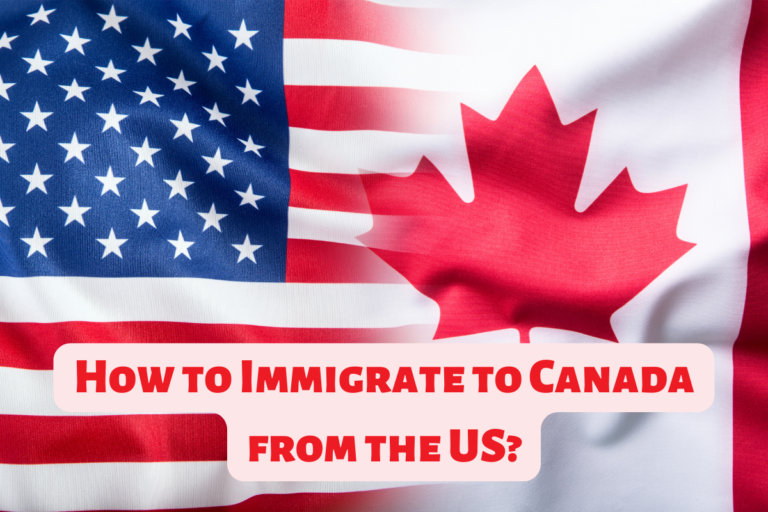How Many Points Are Required For Canada PR – Improve Your CRS Score
Know Your Points with the Canada PR points calculator
Canada uses a points-based system called the Comprehensive Ranking System (CRS) to determine eligibility for permanent residency. The CRS assigns points based on factors such as age, education, language proficiency, work experience, and other criteria.
Applicants who score high enough in the CRS are eligible to receive an invitation to apply (ITA) for permanent residency through one of the immigration programs, such as the Federal Skilled Worker Program (FSWP), Federal Skilled Trades Program (FSTP), or Canadian Experience Class (CEC).
To improve your chances of being selected for permanent residency, it’s important to ensure that you meet the eligibility criteria and maximize your CRS score. Some ways to do this may include improving your language proficiency, obtaining additional education or work experience, and securing a job offer in Canada.
It’s important to note that the CRS score required to receive an ITA can vary depending on the number of applicants in the pool and other factors, so there is no set minimum score required for permanent residency.
What is Express Entry for Canada PR?
Express Entry is an online system used by the Canadian government to manage applications for permanent residency through the Federal Skilled Worker Program (FSWP), Federal Skilled Trades Program (FSTP), and Canadian Experience Class (CEC).
Under the Express Entry system, eligible candidates are required to create an online profile and submit an Expression of Interest (EOI) to be considered for permanent residency. The CRS score is used to rank the profiles of candidates based on their age, education, work experience, language proficiency, and other factors.
The highest-ranking candidates are then invited to apply for permanent residency through regular Express Entry draws, which typically take place every two weeks. Candidates who receive an Invitation to Apply (ITA) have 60 days to submit a complete application for permanent residency.
Express Entry was introduced in January 2015 and has become the main pathway for economic immigration to Canada. The system aims to make the immigration process faster and more efficient, while also ensuring that Canada can attract highly skilled workers who can contribute to the country’s economy.
How does Express Entry Work?
The Express Entry system for Canadian permanent residency works in the following way:
- Eligibility Assessment: The first step in the Express Entry process is to determine if you meet the eligibility requirements for one of the three federal economic immigration programs: Federal Skilled Worker Program (FSWP), Federal Skilled Trades Program (FSTP), or Canadian Experience Class (CEC).
- Create an Online Profile: If you are eligible, you will need to create an online profile in the Express Entry system. You will be required to provide information about your age, education, language proficiency, work experience, and other relevant details.
- Comprehensive Ranking System (CRS): Once your profile is complete, you will be assigned a score based on the Comprehensive Ranking System (CRS). The CRS is a points-based system that assigns points to candidates based on various factors, such as age, education, work experience, language proficiency, and other criteria.
- Invitation to Apply (ITA): Candidates who have the highest CRS scores are then invited to apply for permanent residency through regular Express Entry draws, which typically take place every two weeks. Candidates who receive an Invitation to Apply (ITA) have 60 days to submit a complete application for permanent residency.
- Permanent Residency Application: If you receive an ITA, you will need to submit a complete application for permanent residency within the 60-day deadline. This includes providing additional documentation and undergoing a medical exam and security check.
- Decision: The Canadian government will then review your application and make a decision on whether to grant you permanent residency.
Overall, the Express Entry system aims to make the immigration process faster and more efficient, while also ensuring that Canada can attract highly skilled workers who can contribute to the country’s economy.
Minimum Points required to be eligible for Canada PR
The minimum points required to be eligible for Canada PR through the Express Entry system can vary with each draw. The CRS score requirement is determined by the number of candidates in the Express Entry pool and the number of invitations to apply (ITA) issued by the Canadian government.
That being said, there is no set minimum CRS score that guarantees an ITA for permanent residency. However, candidates who have a CRS score of at least 440 points have a good chance of receiving an ITA. In some cases, the CRS score requirement may be lower, particularly for candidates who have a valid job offer from a Canadian employer or a nomination from a Canadian province or territory.
It’s important to note that meeting the minimum eligibility requirements for one of the economic immigration programs, such as the Federal Skilled Worker Program (FSWP), Federal Skilled Trades Program (FSTP), or Canadian Experience Class (CEC), is the first step in the process. Candidates who meet these requirements can then create an Express Entry profile and begin earning CRS points based on their age, education, language proficiency, work experience, and other factors.
CRS Score Calculation for Express Entry Candidates
The Comprehensive Ranking System (CRS) is a points-based system used by the Canadian government to rank candidates in the Express Entry pool. Candidates are awarded points based on various factors that contribute to their ability to succeed in Canada’s economy. The factors and corresponding points are as follows:
- Age: Candidates can earn up to 110 points based on their age at the time of application. The maximum points are awarded to candidates between the ages of 20 and 29.
- Education: Candidates can earn up to 150 points based on their level of education. Points are awarded based on the highest level of education completed, and additional points are awarded for a Canadian education.
- Language Proficiency: Candidates can earn up to 160 points for their language proficiency in English and/or French. Points are awarded based on their scores in the International English Language Testing System (IELTS) or Canadian Language Benchmark (CLB) exams.
- Work Experience: Candidates can earn up to 80 points for their work experience, with more points awarded for longer periods of work experience. Points are also awarded based on the National Occupational Classification (NOC) skill level of their work experience.
- Spouse/Common-law Partner: Candidates can earn up to 40 points for their spouse or common-law partner’s language proficiency, education, and Canadian work experience.
- Additional Factors: Candidates can earn up to 600 points for additional factors such as a provincial nomination, a valid job offer from a Canadian employer, or a Canadian education.
Once all the factors are assessed, the CRS score is calculated out of a possible 1,200 points. The highest-ranking candidates in the Express Entry pool are then invited to apply for permanent residency through regular Express Entry draws, which typically take place every two weeks.
8 Different ways to improve your CRS score
If you are an Express Entry candidate for Canadian permanent residency, there are several ways to improve your Comprehensive Ranking System (CRS) score. Here are 8 different ways to increase your CRS score:
- Improve Your Language Proficiency: Language proficiency in English and/or French is a significant factor in the CRS score calculation. You can consider retaking the language test and improving your score to increase your CRS score.
- Get Education Credential Assessment (ECA): If you have completed your education outside of Canada, it is essential to get an ECA done to prove the equivalency of your degree/diploma to a Canadian one. It will help you earn additional CRS points.
- Gain More Work Experience: The more work experience you have, the more CRS points you can earn. You can consider gaining additional work experience in your field to increase your CRS score.
- Improve Your Education: You can also consider pursuing additional education, such as a diploma or a degree, to improve your CRS score.
- Apply for Provincial Nomination: You can increase your CRS score by applying for a provincial nomination through a provincial nominee program (PNP). If you receive a provincial nomination, you can earn up to 600 additional CRS points.
- Apply with a Valid Job Offer: If you have a valid job offer from a Canadian employer, you can earn up to 200 additional CRS points.
- Apply with a Spouse/Common-law partner: If your spouse or common-law partner accompanies you to Canada, you can earn additional CRS points for their language proficiency, education, and Canadian work experience.
- Retake the IELTS or CELPIP test: If you have previously taken the IELTS or CELPIP language test and have not achieved your desired score, you can retake the test and submit the highest score in your Express Entry profile.
It is important to note that these factors are just some of the ways you can increase your CRS score. You should consult with a Canadian immigration expert or a lawyer to determine the best course of action to improve your CRS score.
Work Experience Required to Apply for PR through Express Entry
To apply for permanent residency through the Express Entry system, candidates must have at least one year of skilled work experience in a National Occupational Classification (NOC) level 0, A, or B occupation.
Skilled work experience is defined as full-time or an equal amount of part-time hours (i.e., 1,560 hours) within the last ten years. The work experience must be in a skilled occupation, which means the duties of the job must match the requirements listed in the NOC.
To be eligible, candidates must have gained skilled work experience within the last ten years. It is important to note that work experience gained outside of Canada may also be considered, but the candidate will need to provide documentation and proof of their employment history, including job titles, duties, and responsibilities.
It’s also worth noting that candidates with Canadian work experience may be eligible to apply under the Canadian Experience Class (CEC) program, which has different requirements for work experience. In this case, the work experience must be gained in Canada and meet specific requirements related to NOC skill level, duration, and language proficiency.
Applying with Your Spouse for Canada PR
If you are applying for permanent residency in Canada through the Express Entry system, you can include your spouse or common-law partner in your application. There are several benefits to applying with your spouse, including:
- Additional CRS Points: You can earn additional points for your spouse or common-law partner’s language proficiency, education, and Canadian work experience.
- Combine Financial Resources: If you are applying with your spouse, you can combine your financial resources, which may help you meet the minimum settlement funds requirement.
- Increase Your Chances of Success: Applying with your spouse can help you increase your chances of success as you can pool your skills and resources to enhance your overall profile.
However, it’s important to note that including your spouse or common-law partner in your application means that their background, including criminal and medical history, will also be taken into account during the application process. Additionally, your application will be assessed based on the lowest CRS score between you and your spouse or common-law partner.
If you are considering applying with your spouse or common-law partner, it’s important to seek advice from a qualified immigration consultant or lawyer to ensure that you are making the best decision for your individual circumstances.
IELTS Score for Canada PR Points Calculation
For Express Entry candidates, the International English Language Testing System (IELTS) score is an important factor in the Comprehensive Ranking System (CRS) score calculation, which determines a candidate’s eligibility for Canadian permanent residency.
To earn points for language proficiency, candidates must take the IELTS General Training test and receive a score that meets the minimum requirements for the Federal Skilled Worker (FSW) program, the Federal Skilled Trades Program (FSTP), or the Canadian Experience Class (CEC).
The minimum IELTS score requirements for each program are as follows:
- FSW program: candidates must have a minimum score of 6.0 in each language ability (reading, writing, speaking, and listening) for a total of 24 points.
- FSTP: candidates must have a minimum score of 5.0 in speaking and listening and a minimum score of 4.0 in reading and writing.
- CEC: candidates must have a minimum score of 7.0 in each language ability (reading, writing, speaking, and listening) for a total of 24 points.
It’s important to note that a higher IELTS score can earn candidates more CRS points, which can increase their chances of being selected for an Invitation to Apply (ITA) for permanent residency in Canada. Additionally, candidates may also be required to meet minimum language proficiency requirements set by their intended province of settlement or their employer, depending on their specific situation.
Conclusion
In conclusion, the Express Entry system is a popular pathway for skilled workers to immigrate to Canada and obtain permanent residency. To be eligible, candidates must meet the minimum requirements for work experience, education, language proficiency, and other factors, and then create an online profile to enter the Express Entry pool. Candidates are then ranked based on their Comprehensive Ranking System (CRS) score, which is calculated using various factors including age, language proficiency, education, work experience, and other criteria. By improving their CRS score, candidates can increase their chances of receiving an Invitation to Apply (ITA) for permanent residency in Canada. It’s important to note that applying for permanent residency through the Express Entry system can be a complex and time-consuming process, so it’s recommended that candidates seek the advice of a qualified immigration consultant or lawyer to ensure that they are making informed decisions throughout the application process.




